Start date:
Course information
Typical offer BCC
UCAS code F993
Institute code L34

Accredited by the Geological Society of London

Ranked 1st in subjects aligned to Geology for ‘overall positivity’ in the NSS 2025 (according to Times Higher Education NSS 2024 methodology applied to the NSS 2025 data).
Course description
Course description
Geology at Leicester provides a friendly, dynamic and supportive environment in which to learn about the history of our planet and life on Earth. You will be taught by staff recognised internationally for their expertise in fields such as palaeontology, economic geology, volcanology, structural geology, geophysics, and palaeoenvironments. You will benefit from our excellent facilities, ranging from dedicated student study spaces, 24/7 secure access to the building, and collections of over 250,000 specimens of rocks, fossils and minerals to help you learn. In later years, you can choose modules that give you experience of our research facilities, including advanced microscopes and geochemistry labs.
All of our geology-focussed degrees include common modules in the first year, so you can easily transfer between courses as you discover the topics that inspire you most and best match your career aspirations. From the third year you can choose from a range of optional modules, and it is also possible to transfer between the three-year BSc and the four-year MGeol degrees, so you can graduate with the most appropriate qualification for your future career. Our Physical Geography and Geology degree is a bit different, with a tailor-made programme right from the start, and plenty of options later on. For details of all the modules, follow the links under each degree course.
We pride ourselves on our excellent staff-student relations and have high student satisfaction levels, not least because of our small-group teaching and tutorials, which provide individually tailored academic and pastoral support throughout your degree. You will learn through a combination of lectures, practical classes, workshops, small-group tutorials, and field trips. This means you will have plenty of contact time with the lecturers, who are happy to provide feedback as you progress through each module. Your assessments will be a mixture of exams, presentations, written reports, group projects and other activities, as we recognise that everyone has different strengths and preferred ways of learning. For many students, fieldwork is one of the highlights of their time at Leicester.
All of our geology focussed courses are accredited by the Geological Society, demonstrating that our degrees offer high-quality teaching as well as providing the skills necessary for a career as a professional geoscientist. Furthermore, our graduates are highly sought after in many professions because of the breadth of skills you will develop, including high levels of independence, team-working, and data analysis. We have a strong emphasis on embedding skills within our modules, and we provide careers advice throughout your degree, including an annual in-house careers event and through our excellent links with industry partners and alumni.
With diverse modules to choose from to develop your own interests, and with excellent field programmes and numerous scholarships and bursaries available to support your studies, we are committed to helping you achieve your full academic potential.Entry requirements
Entry requirements
- A-levels: BCC or points equivalent from your best three A-levels. One science subject preferred.
- GCSE: Grades C/4 in Maths (if no A-level Maths) and English Language.
- BTEC Diploma: DDM in a science related subject, which must include appropriate maths and science content.
- International Baccalaureate: Pass diploma with 26 points minimum, one HL science subject preferred. Must have maths and English if not held at GCSE grade C/4.
- Access to HE: Pass diploma with 24 Distinctions in a science related subject, which must include appropriate maths and science content.
- T-Levels: Merit overall in Science (Laboratory Technician).
Other official national and international qualifications considered from across the world. You can review some of the qualifications we accept on our countries page and English Language equivalencies.
If your qualification or country is not listed, please contact us for more information, including the name and result of the qualification you have studied.
Flexible entry requirements
We welcome applications from motivated students whose predicted grades are slightly below our standard entry requirements. We understand that predicted grades are not always an accurate reflection of your final results, and we’re happy to consider your application. Although we can’t guarantee an offer due to the high volume of applications, if you’re eligible, we may still offer you a place based on our standard requirements.
Contextual offers
The University of Leicester is committed to providing equitable opportunities for all applicants from all backgrounds. We make contextual offers to support students who may be impacted by the area they live in, their personal circumstances or who have completed one of our progression programmes. These offers are usually one or two grades lower than the standard entry requirements. To qualify for a contextual offer, you must apply for an eligible course and meet specific criteria – check if you’re eligible.
Selection process
When considering your application, we will look for evidence that you will be able to fulfil the objectives of the course and achieve the standards required. We will take into account a range of factors including previous exam results.
English Language Requirements
IELTS 6.0 or equivalent. If your first language is not English, you may need to provide evidence of your English language ability. If you do not yet meet our requirements, our English Language Teaching Unit (ELTU) offers a range of courses to help you to improve your English to the necessary standard.
International Qualifications
Find your country in this list to check equivalent qualifications, scholarships and additional requirements.
Countries listFees and funding
Fees and funding
UK Students
- £9,790 in your first year, subject to Parliamentary approval.
The fee listed above applies to the Foundation Year only. Tuition fees for subsequent years of the degree will be charged at the standard undergraduate rate set by the UK Government. For the 2027/28 academic year, the Home UK tuition fee is expected to be £10,050, subject to Parliamentary approval. Further increases are anticipated to be implemented automatically through government legislation, therefore it is likely that your tuition fees will rise for each subsequent year of your studies.
All of our core (years one and two) field course costs are largely subsidised by the University of Leicester and we ask only for annual contributions of £100 in year one and £250 in year two. Optional final year field courses do come with additional costs, although there are bursaries available.
Find out more about tuition fees, including year abroad, placement years, scholarships and funding.
International Students
Starting in 2026
- Foundation Year: £20,750
The fee listed above applies to the foundation year only. Tuition fees for subsequent years of the degree will be charged at the standard undergraduate rate for the course, based on the year the student first started their foundation year. Therefore, students who begin their foundation year in 2026/27 and progress to their undergraduate degree in 2027/28 will pay £25,100 per year for the remainder of their course.
All of our core (years one and two) field course costs are largely subsidised by the University of Leicester and we ask only for annual contributions of £100 in year one and £250 in year two. Optional final year field courses do come with additional costs, although there are bursaries available.
Find out more about tuition fees, including year abroad, placement years, scholarships and funding.
Accreditation
Accreditation
All our degrees are accredited by the Geological Society of London, the professional body for geologists in the UK. Their accreditation panel said that our courses are “excellent” and they were “particularly impressed by the amount of fieldwork undertaken.”
Careers and employability
Careers and employability
Our Geology graduates are highly competitive in the job market as their degrees provide them with a strong set of subject-specific and transferable skills, suited to a range of different sectors. Career directions particularly include renewable energy, sustainable resource extraction and environmental geology. As well as studying topics that consider the major global challenges of the 21st century, our graduates are able to demonstrate key skills in teamwork, communication, resilience, planning, and problem solving.
Key statistics
- 95% of graduates in work or further study after 15 months.
- More than 50 companies are actively involved with Geology at Leicester, from funding major research projects to work experience opportunities.
- Geology graduate employers include: Environment Agency, Network Rail, The British Museum, BP, Rio Tinto, British Gypsum, RSK, Jacobs, Hydrock, Zeiss, The Civil Service, Capita, The Government of South Australia, Isle of Man Government.
Supported by the University’s Careers and Employability Service, employability is embedded in all of our curricula from year one:
- The Leicester Award for Employability personal development programme is embedded in core year one and year two modules, providing students with opportunities to reflect on their motivations, personality traits, transferable skills, and future career goals.
- All students have lifetime access to and support from our award-winning Careers and Employability Service.
- We have a dedicated Geology Careers Tutor who works with the Careers and Employability Service to support careers fairs, disseminate job opportunities and career development courses, and to provide practical information.
- We run a School-wide annual careers day; recent speakers have included the Civil Service, Hatch Regeneris, Hydrock, RSK, the Leicestershire and Rutland Wildlife Trust, the Environment Agency, Ordnance Survey and the Centre for Ecology and Hydrology.
- All of our degrees include an additional ‘Year in Industry’ option, where the third year of the degree is spent on a work placement.
- Our School has links with many businesses and Government departments, including Natural England, the European Space Agency, the Home Office and the Joint Research Centre of the European Commission.
Case studies
 Zach Banks (MGeol, Geology) Senior Policy advisor for the Department for Energy Security and Net Zero “My role is supported by the range of modules I selected in my degree, particularly the third year Environmental Geoscience module and my fourth year ‘Hot topics’ module. These gave me confidence in presenting and developing new ideas, skills in evaluating arguments and ideas, and opened my eyes to the interactions between geology, human activity and legislation.”
Zach Banks (MGeol, Geology) Senior Policy advisor for the Department for Energy Security and Net Zero “My role is supported by the range of modules I selected in my degree, particularly the third year Environmental Geoscience module and my fourth year ‘Hot topics’ module. These gave me confidence in presenting and developing new ideas, skills in evaluating arguments and ideas, and opened my eyes to the interactions between geology, human activity and legislation.”
 Kiera McMahon (BSc Applied and Environmental Geology) Geological Engineer in the ground investigations industry “I work with drillers, excavators and engineers to plan construction and to monitor and mitigate the environmental impact of building works. This variously includes asbestos sampling, water quality monitoring and assessing foundations. My second and third year Mineral Resources for Net-Zero Carbon modules, and the Mineral Exploration, Economics and Sustainability module have really supported my career.”
Kiera McMahon (BSc Applied and Environmental Geology) Geological Engineer in the ground investigations industry “I work with drillers, excavators and engineers to plan construction and to monitor and mitigate the environmental impact of building works. This variously includes asbestos sampling, water quality monitoring and assessing foundations. My second and third year Mineral Resources for Net-Zero Carbon modules, and the Mineral Exploration, Economics and Sustainability module have really supported my career.”
 Alfie Bower (BSc Geology) Offshore Geotechnical Engineer “My role involves the collection and interpretation of drilling vessel geotechnical data. Much of our work is focused on seabed surveys for future offshore wind farm construction. I use the practical skills from my degree most days, particularly through my role in describing and logging the variety of sediments and rock types in our drill cores, and in the interpretation of geophysical data.”
Alfie Bower (BSc Geology) Offshore Geotechnical Engineer “My role involves the collection and interpretation of drilling vessel geotechnical data. Much of our work is focused on seabed surveys for future offshore wind farm construction. I use the practical skills from my degree most days, particularly through my role in describing and logging the variety of sediments and rock types in our drill cores, and in the interpretation of geophysical data.”
Alex Talbot-Wilson (BSc Geology) Graduate geologist at Glencore “I provide geological support for 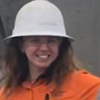 mining operations, including mapping and monitoring of mining pits using drones and GIS software, collection of near-pit data and development of our exploration programmes. The third year module Mineral Exploration, Economics and Sustainability influenced my career, and inspired being involved in the sustainable production of key resources for the future."
mining operations, including mapping and monitoring of mining pits using drones and GIS software, collection of near-pit data and development of our exploration programmes. The third year module Mineral Exploration, Economics and Sustainability influenced my career, and inspired being involved in the sustainable production of key resources for the future."
Maduo Makwati (BSc Geology) Hydrogeology Official for the Debswana Diamond Company, Botswana 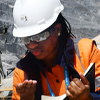 “My role is focused on understanding the role of hydrogeology in our mining operations. I collect mine borehole data, monitor rock porewater contents and sample groundwater for geochemical analysis. These data feed into our mine water balance modelling. I use a range of skills from my degree, including geological mapping and logging, as well as industry-standard software such as ArcGIS.”
“My role is focused on understanding the role of hydrogeology in our mining operations. I collect mine borehole data, monitor rock porewater contents and sample groundwater for geochemical analysis. These data feed into our mine water balance modelling. I use a range of skills from my degree, including geological mapping and logging, as well as industry-standard software such as ArcGIS.”
Careers and Employability Service
Get career-ready at Leicester with guidance from our award-winning Careers and Employability Service. We're here to give you a lifetime offer of support, even after graduation. Our team of specialist careers advisers and mentors will help you every step of the way. From supporting you with CVs and interviews, to volunteering opportunities and placements, we're here to help you reach your professional goals.
Sustainable Development Goals
Sustainable Development Goals
We are committed to providing skills and knowledge to help prepare you tackle global challenges. We have mapped our undergraduate degrees for learning which aligns to the 17 UN Sustainable Development Goals.
This degree includes learning which relates to the following UN Sustainable Development Goals:
- Goal 3: Health and well-being
- Goal 12: Responsible consumption and production
- Goal 13: Climate action
- Goal 15: Life on land
Course structure
Foundation Year
Foundation Year
Modules
- Fundamental Mathematics
- Scientific Computing
- Principles of Earth Science and Earth Systems
- Introductory Chemistry Practical
- Introductory Data Analysis
- Academic Support
- Introductory Earth and Environmental Science (double module)
The modules listed reflect those currently available to students. Every year, we review our modules and their content to ensure that our courses maintain the best academic and student experience possible. Whilst this does mean elements of your course may change in future academic years, it ensures your course is giving you a research-inspired education and preparing you for your future.
Year 1
Year 1
You will have a broad introduction to geoscience and discover the role of geology and geoscientists in today's society.
Modules
- First Year Tutorials
- Evolution of the Earth System
- Palaeobiology and the Stratigraphic Record
- Natural Resources and Energy for the 21st Century
- Geological Maps and Structures
- Introductory Field Course
- From Core to Crust
- Our Dynamic Planet
The modules listed reflect those currently available to students. Every year, we review our modules and their content to ensure that our courses maintain the best academic and student experience possible. Whilst this does mean elements of your course may change in future academic years, it ensures your course is giving you a research-inspired education and preparing you for your future.
Year 2
Year 2
Year 2 of the BSc course is your third year at Leicester.
You will learn about more advanced aspects of geosciences such as the conditions required to form magmatic, metamorphic, and sedimentary rocks.
Core modules
- Geological Fieldwork: Methods and Applications
- Mapping Earth’s History: structural and stratigraphic field techniques
- Magmatic and Metamorphic Processes
- Depositional Processes and Environments
- Introduction to Geochemistry
- Structure and Tectonics
- Climate Change: Impacts, Vulnerability and Adaptation
Option modules
Choose one option module from:
The modules listed reflect those currently available to students. Every year, we review our modules and their content to ensure that our courses maintain the best academic and student experience possible. Whilst this does mean elements of your course may change in future academic years, it ensures your course is giving you a research-inspired education and preparing you for your future.
Optional Year in Industry
Optional Year in Industry
If you want to, you can take a year out between your second and third years and spend that time working in industry.
If you choose to do this, you’ll take a module in your second year that will help you to find a work placement and prepare you for the workplace. Throughout your placement, there will be structured support available to you from specialist staff at the University.
You’ll benefit from real-world experience in a commercial setting, enabling you to make an easier transition from studying to working after you finish your degree. It will also strengthen your CV significantly in preparation for entering the graduate labour market. On top of all this, you’ll be paid a salary for your placement.
The modules listed reflect those currently available to students. Every year, we review our modules and their content to ensure that our courses maintain the best academic and student experience possible. Whilst this does mean elements of your course may change in future academic years, it ensures your course is giving you a research-inspired education and preparing you for your future.
Final Year
Final Year
During your final year you will have the opportunity to take your degree in the direction that you want. The core modules will ensure that you are advancing in the essential areas of geology. Optional modules provide the chance to continue with the fundamental principles of geology at an advance level or specialise in the areas that fascinate you.
Core modules
Option modules
Choose two option modules from:
- Environmental Geoscience
- Diversity and Evolution of Vertebrates
- Crustal Dynamics
- Sustainability Enterprise Partnership Project
Then choose three option modules from
- Planetary Science
- The Forensic, Archaeological and Geological Application of Microfossils
- Mineral Exploration, Economics and Sustainability
- The Mining Lifecycle Field Course – Cornwall
- Key Events in the Evolution of Planet Earth Viewed Through the Geological Lens of Wales - a field course
- Physical Volcanology
- Mineral Resources for Net-Zero Carbon 2
- Stable Isotopes in the Environment
- Water Quality Processes and Management
This is the same as Year 3 of the MGeol.
The modules listed reflect those currently available to students. Every year, we review our modules and their content to ensure that our courses maintain the best academic and student experience possible. Whilst this does mean elements of your course may change in future academic years, it ensures your course is giving you a research-inspired education and preparing you for your future.
Fieldwork
Fieldwork
Fieldwork can be one of the most stimulating and enjoyable experiences of your time on a Geology degree. Your field experience begins in the very first week of your studies with a day spent investigating the fascinating local geology of Leicestershire.
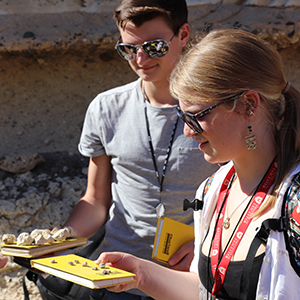
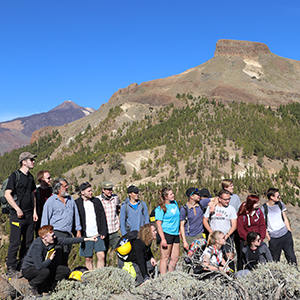
In year one, the Introductory Field Course takes place on Arran, a Scottish island with more geological variety per square kilometre than virtually anywhere else in the world. You’ll rapidly develop observation and recording skills through active participation in scientific discovery.
In your second year you will focus on developing the skills that will enable you to carry out your own geological fieldwork in a variety of terrains. We’ll guide you through this with field trips to Spain and Anglesey.
In your final year, you will carry out an Independent Field-based Project. You get to choose your own field area, allowing you to develop your geological interests (and showcase an impressive range of transferable skills!). Depending on the specialist modules you choose, there are also trips available to Tenerife, Cornwall and Pembrokeshire.
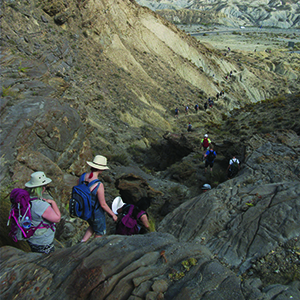
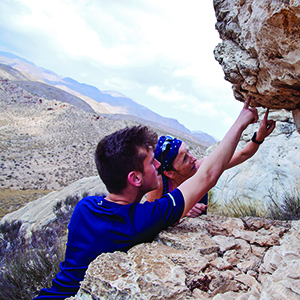
If you study for (or transfer onto) a four-year MGeol course, your final year has an optional residential field course. Some research projects can involve fieldwork, too.
All of our core (years one and two) field course costs are largely subsidised by the University of Leicester and we ask only for annual contributions of £100 in Year 1 and £250 in Year 2. Optional third year field courses do come with additional costs, although there are bursaries available.
And you’ll be pleased to know our staff are involved in field-based research worldwide, ensuring that our teaching draws on active field experience.
Fieldwork locations may vary and are subject to availability.
The modules listed reflect those currently available to students. Every year, we review our modules and their content to ensure that our courses maintain the best academic and student experience possible. Whilst this does mean elements of your course may change in future academic years, it ensures your course is giving you a research-inspired education and preparing you for your future.
Why Leicester?
Job prospects are excellent: 95% of our Geology students are employed (or studying for a Masters degree) six months after graduating. (DLHE)
All our degrees are accredited by the Geological Society of London. They said that our courses are “excellent” and they were “particularly impressed by the amount of fieldwork undertaken”.
Your degree will take you to geologically fascinating locations across the UK and further afield, starting with a Year 1 trip to the Isle of Arran.
Ranked top 3 in subjects aligned to Geology for ‘Teaching on my course’, ‘Learning opportunities’ and ‘Student voice’ in the NSS 2025 (according to Times Higher Education NSS 2024 methodology applied to the NSS 2025 data). View the NSS questions all students were asked for individual themes.
Teaching and learning
Teaching
You will be taught through a mixture of lectures, tutorials, seminars, practicals and fieldwork. All lecture material is available online through our virtual learning environment Blackboard. Residential field trips are run by academic staff throughout the degree and provide extended periods of small group teaching in field contexts.
Assessment
You will be assessed through a combination of coursework, fieldwork, independent reports and projects, seminars, oral and poster presentations and computer-based tests, as well as formal exams.
We place a strong emphasis on safety training, time management, and student initiative.
Your personal tutor will provide you with individually tailored academic support throughout your degree. You will receive non-assessed feedback on every module to help you improve and prepare for your assessed work.
Through the Student-Staff Committee you can raise any issues relating to your studies and suggest course developments.
Independent learning
When not attending lectures, seminars or other timetabled sessions you will be expected to continue learning independently through self-study. Typically, this will involve reading journal articles and books, working on individual and group projects, undertaking research in the library, preparing coursework assignments and presentations, and preparing for exams. To help with your independent learning, you can access the Library and our social study spaces in halls of residence.
Your contact hours will depend on the option modules you select. You can see details of the contact hours on individual module pages.
Academic support
Our Centre for Academic Achievement provides help in the following areas:
- study and exam skills
- academic writing
- presentations
- dissertations
- numerical data skills
- referencing sources
Our AccessAbility Centre offers support and practical help for students with dyslexia or other specific learning difficulties, including physical, mental health or mobility difficulties, deafness, or visual impairment.
Teaching staff
You will be taught by an experienced teaching team whose expertise and knowledge are closely matched to the content of the modules on the course. PhD research students who have undertaken teacher training may also contribute to the teaching of seminars under the supervision of the module leader. Our teaching is informed by the research we do. You can learn more about our staff by visiting our staff profiles.
Apply now
| Course | Qualification | Duration | UCAS Code | Availability |
|---|---|---|---|---|
| Course Geology with Foundation Year | Qualification BSc | Duration 4 years full-time | UCAS Code F993 | Availability How to apply |
| Course Geology with Foundation Year with Year in Industry | Qualification BSc | Duration 5 years | UCAS Code F993 | Availability How to apply |
Data about this course

There is a real sense of community within Geology. The lecturers are incredibly approachable.




